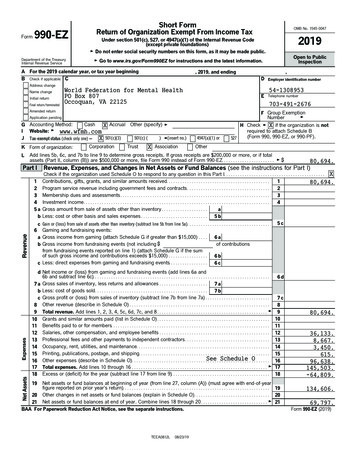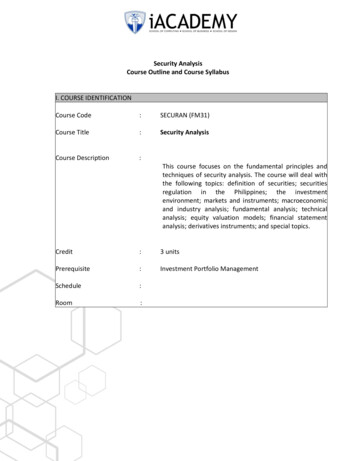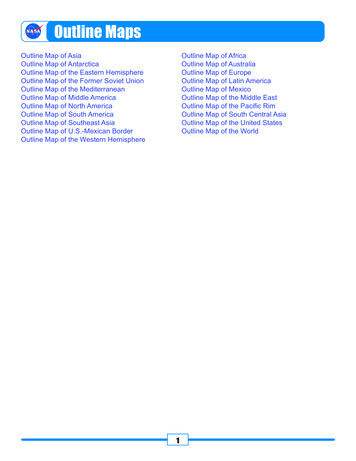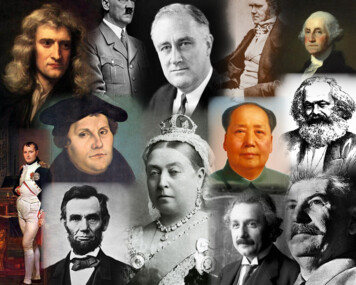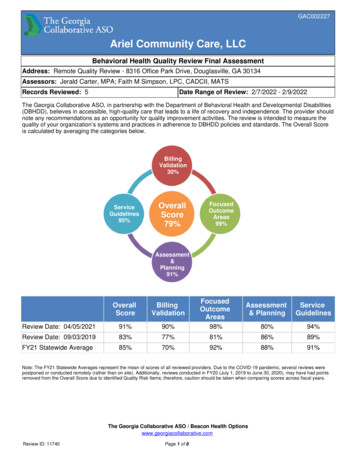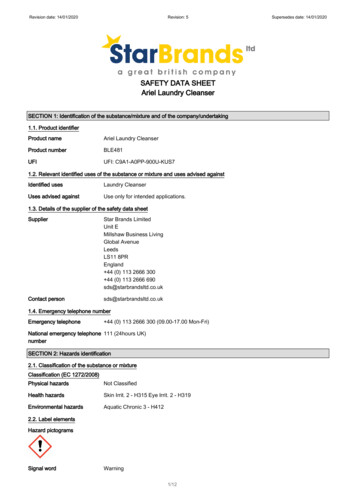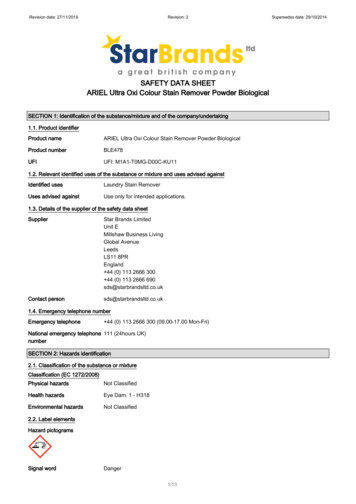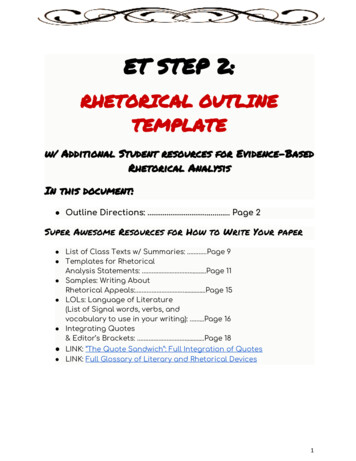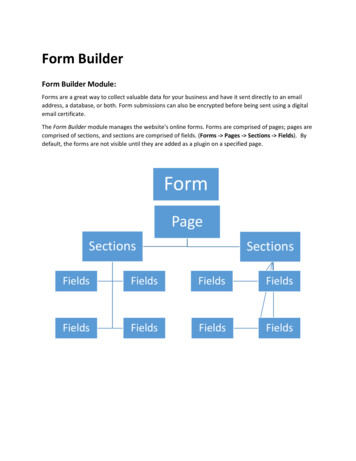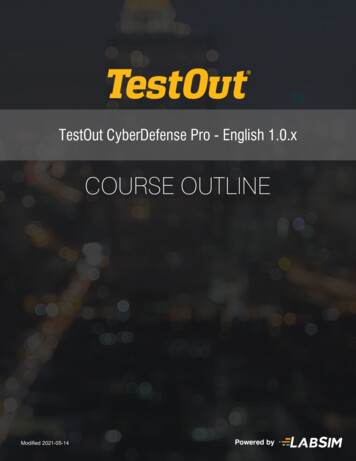
Transcription
Ariel University – Course Outline Form1. Course General InformationCourse NameIntroduction to Psychology AFaculty Humanity and SocialDepartmentSciencesCourse NumberPrerequisitesLanguage3CourseLevelCourse TypeCourseCategoryBehavioral SciencesLocal credit12SemesterAECTS26.8 Hebrew English Russian Arabic Other Undergraduate Graduate Required Elective Required for a specific track Core course Track specific core course Supportive Course GeneralCourse2. Method of instructionActivityFrontal LectureTutor sessionsLaboratoryWorkshopIndividual meetingsOtherHours/week2Comments3. Staff and t(s)LocationNameDr. Daniel-Robert ChebatE-maildanielc@ariel.ac.ilDr. Daniel-Robert Chebatdanielc@ariel.ac.ilDayHours2 academic hoursLocal credit is generally determined by amount of instruction hours in class 1ECTS is determined by expected total time invested by the student 1ECTC 25-30 hours 2Tick all that apply 3
4. Course PlanCourse ObjectivesLearning OutcomesCourse DescriptionThe course Introduction to Psychology enables basic knowledge inthe field of Psychology and its goal is to teach fundamentalprinciples, approaches, and theories in the field of Psychology.During the course, students will be able to answer questions aboutthe basic theories and think critically about the main fields ofresearch in psychology. Learning outcomes will be measuredthrough in class quizzes and questions and will help determine theability of the student to remember, use and classify the vastamounts of information covered during the course. Students whosuccessfully complete the course will be able to compare differenttheories in psychology and discuss them critically.Psychology is a relatively young science, roughly only 150 yearsold. Over the years, psychology has expanded and flourished intomany different research fields. Course description should include abrief description of course focus and aims.5. Weekly subjects and required materialsSyllabus is based on 13-week period excluding the final examsWeekSubjectsRequired Materials12-Review of Syllabus and Course objectivesPsychology as a Science-Psychology is a science-Critical Thinking-History of Psychology-Modern Psychology-Psychological Science-The Scientific Method-The Need for psychological ScienceSyllabusChapter 1: Psychological ScienceChapter 1: Psychological Science3The Biological Basis of BehaviorChapter 2: The Biological Basis ofBehavior4 The endocrine system› Components of the endocrine system› Effects of the endocrine system on behavior Behavioral genetics› Genes, temperament, and heredity› Adaptive value of traits and behaviors› Interaction between heredity and environmentalinfluences Influence of genetic and environmental factors on thedevelopment of behaviors› Experience and behavior (PSY)› Regulatory genes and behavior (BIO)› Genetically based behavioral variation in naturalpopulations Human physiological development (PSY)› Prenatal development› Motor developmentChapter 2: The Biological Basis ofBehavior The nervous system› Neurons (e.g., the reflex arc)› Neurotransmitters› Structure and function of the peripheral nervoussystem› Structure and function of the central nervous system The brain› Forebrain› Midbrain› Hindbrain› Lateralization of cortical functions› Methods used in studying the brain The spinal cord Neuronal communication and its influence onbehavior(PSY) Influence of neurotransmitters on behavior (PSY)
› Developmental changes in adolescence56Consciousness States of consciousness› Alertness (PSY, BIO)› Sleep Stages of sleep Sleep cycles and changes to sleep cycles Sleep and circadian rhythms (PSY, BIO) Dreaming Sleep-wake disorders› Hypnosis and meditation Consciousness-altering drugs› Types of consciousness-altering drugs and theireffectson the nervous system and behavior› Drug addiction and the reward pathway in the brainAttention (PSY) Selective attention Divided attentionCognition (PSY) Information-processing model Cognitive development› Piaget’s stages of cognitive development› Cognitive changes in late adulthood› Role of culture in cognitive development› Influence of heredity and environment on cognitivedevelopment Biological factors that affect cognition (PSY, BIO) Problem-solving and decision-making› Types of problem-solving› Barriers to effective problem-solving› Approaches to problem-solving› Heuristics and biases (e.g., overconfidence, beliefperseverance)Chapter 3: ConsciousnessChapter 3: Consciousness7SensationChapter 6: Sensation & Perception8PerceptionChapter 6: Sensation & Perception9Learning & ConditioningChapter 7: Learning Sensation› Threshold› Weber’s Law (PSY)› Signal detection theory (PSY)› Sensory adaptation› Psychophysics Sensory receptors› Sensory pathways› Types of sensory receptorsVision (PSY, BIO) Structure and function of the eye Visual processing› Visual pathways in the brain› Parallel processing (PSY)› Feature detection (PSY) Bottom-up/top-down processing Perceptual organization (e.g., depth, form, motion,constancy) Gestalt principlesHabituation and DishabituationAssociative Learning Classical conditioning (PSY, BIO)› Neutral, conditioned, and unconditioned stimuli› Conditioned and unconditioned response› Processes: acquisition, extinction, spontaneousrecovery, generalization, discrimination Operant conditioning (PSY, BIO)› Processes of shaping and extinction› Types of reinforcement: positive, negative, primary,conditional› Reinforcement schedules: fixed-ratio, variable-ratio,fixed-interval, variable-interval› Punishment› Escape and avoidance learning The role of cognitive processes in associative learning
Biological processes that affect associative learning10LearningChapter 7: LearningObservational Learning Modeling Biological processes that affect observational learning› Mirror neurons› Role of the brain in experiencing vicarious emotions Applications of observational learning to explainindividual behavior11MemoryChapter 8: Memory12MemoryChapter 8: Memory13Review of semesterReview of all the material learnedthroughout the semester towards theexam Encoding› Process of encoding information› Processes that aid in encoding memories Storage› Types of memory storage (e.g., sensory, working,long-term)› Semantic networks and spreading activation Retrieval› Recall, recognition, and relearning› Retrieval cues› The role of emotion in retrieving memories (PSY,BIO)› Processes that aid retrieval Forgetting› Aging and memory› Memory dysfunctions (e.g., Alzheimer’s disease,Korsakoff’s syndrome)› Decay› Interference› Memory construction and source monitoring Changes in synaptic connections underlie memory andlearning (PSY, BIO)› Neural plasticity› Memory and learning› Long-term potentiation6. Main textbook and additional text books- Myers DG, DeWall CN. (2019) Exploring Psychology. 11thCourse Notes/TextbooksSuggested Readings/Materials(Optional Readings)ed. New York, NY: Worth Publishers.- Nolen-Hoeksema, S., Fredrickson, B., Loftus, G. R., & Lutz,C. (2017). Atkinson & Hilgard’s Introduction to psychology17th edition. Washington: Cengage Learning-Gallagher, S. P. (2015). Roger R. Hock, Forty Studies thatChanged Psychology: Explorations into the history ofpsychological research (Global Edition).- Frankl, V. E. (2020). Man's search for meaning (pp. 63-66).London, UK:: Rider Books.7. Assessment:List the number activity/course and the weight of each one towards the final gradeand the total.Not all assessment methods have to be used in every course.If an activity is mandatory for course completion but does not affect grade pleasewrite mandatory.There can only be one final exam.See example in the table.
cationField WorkQuiz/Studio nar/WorkshopMidtermFinal ExamTotal (%)13Weight(%)/activityMandatory6MandatoryWeight (%)111001008. ECTS / Workload TableActivities listed in the ECTS/Workload table should reflect the workload of a studentwho attends all classes completes all the assignments listed in the “Assessment” table.See example in the table.ActivityNumber/courseTotal boratory/ApplicationField WorkQuiz/Studio CritiqueHomework/AssignmentReading Material - Articles4Reading Material – termPreparation for exam665 minute quizzes30 minutes1460.229.2Final ExamTotal122600261203.3 pages per hour 45 pages per hour 520% of total course time 6
9. Course /Program Outcome MatrixThe course does not have to contribute to all program outcomes.If the course does not contribute to a specific program outcome, leave thecontribution level empty.1 Lowest, 5 HighestProgram Competencies/OutcomesContributionLevel1 2 3 4 5X1Sensing the environment – sensory processing and perception2Making sense of the environment – attention, cognition,consciousness, memory, forgetting.X3Biology of behavior – The neural processes underlying behavior,neurons, the brain, function and morphology, brain plasticity.Attitude and behavior change – habituation and dishabituation,associative learning, observational learningX4X
Ariel University - Course Outline Form 1. Course General Information . Changed Psychology: Explorations into the history of psychological research (Global Edition). -Frankl, V. E. (2020). Man's search for meaning (pp. 63-66). London, UK:: Rider Books. 7. Assessment: List the number activity/course and the weight of each one towards the .
